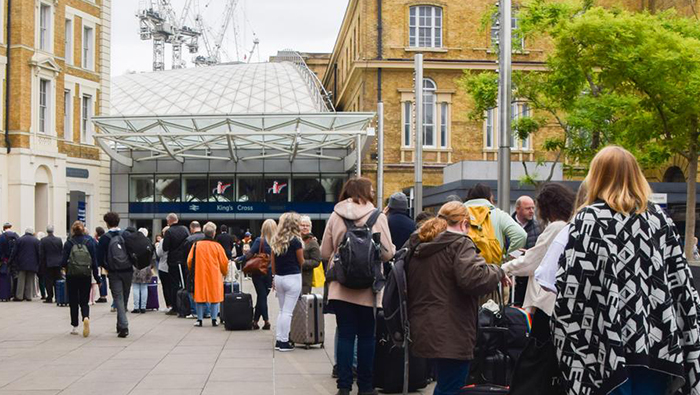
London: The largest rail strike that the UK has seen in years began on Tuesday, with further walkouts planned for later in the week.
Unions have warned there could be coordinated actions across other industries as Britain experiences a cost-of-living crisis.
The strikes are the biggest on the country's railway network since 1989, according to the Rail, Maritime and Transport Workers (RMT) rail union.
The union says the strikes — agreed in a ballot by workers — are needed because wages are not keeping pace with inflation. It also says that action is needed to protect working conditions, jobs, and pensions.
Price increases are at a 40-year high and are predicted to keep on rising with food and fuel prices already pushing inflation close to 10%.
Mick Lynch, Secretary-General of the RMT, said last-minute talks had failed. He claimed a program of planned cuts by train operators amounted to an "aggressive agenda."
"Our campaign will run for as long as it needs to run," Lynch told reporters.
It is thought that the action could be only the beginning of a "summer of discontent" among public sector staff. Teachers, medical staff and waste disposal workers and publicly-employed legal staff are also moving towards industrial action.
The UK government itself predicted that only about 20% of planned services would operate, with further action planned on Thursday and Saturday.
Only about half of the overall network is expected to run, and the impact of the action is also likely to impact days when there is no strike.
Some 50,000 workers were expected to take part in the strike.
The London Underground is also set to mostly close, with strikers there also walking out.
UK Prime Minister Boris Johnson has said industrial action will harm businesses as they continue to recover from the pandemic.
Transport Secretary Grant Shapps decried the strikes as "a huge mistake" and accused the unions of "gunning for this strike."
The UK's Conservative government has so far refused to get involved in the talks to settle the dispute. Ministers have said it is a matter for the unions to work out directly with rail employers.
However, unions say it is a matter for the government because it has not given state-owned infrastructure operator Network Rail enough flexibility to offer a substantial pay increase.
They say the government could do something but instead wants to blame unions and the center-left opposition Labour Party — last in power in 2010 — for the disruption.
"The dead hand of this Tory government is all over this dispute,'' said union chief Lynch.